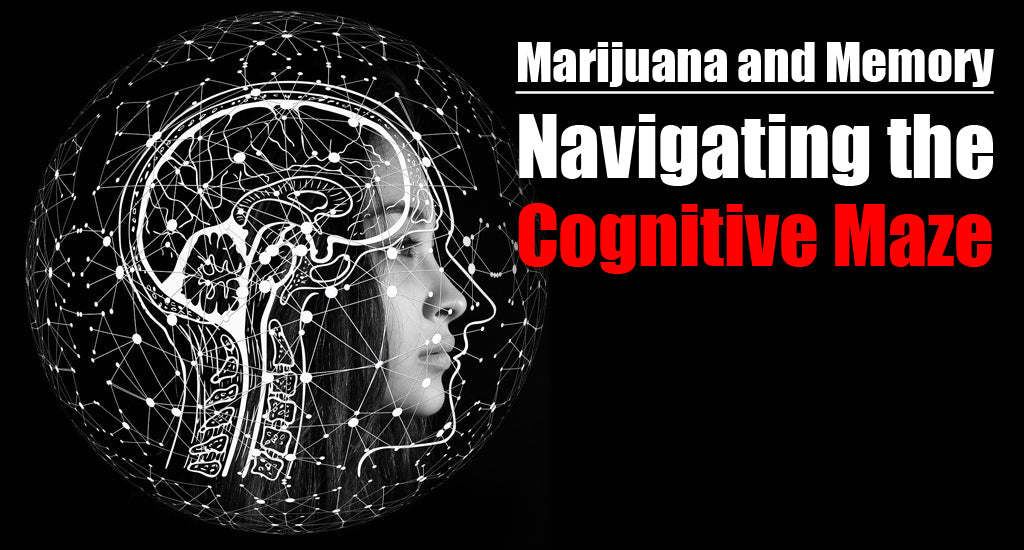
Marijuana and Memory: Navigating the Cognitive Maze
Marijuana has been a contentious topic in the United States for decades. With a growing number of states legalizing its use for medicinal and recreational purposes, there's a pressing need to understand its potential effects on our cognitive functions, particularly memory.
In this article, we will explore the intricate relationship between marijuana and memory, considering both the risks and benefits.
The Basics of Marijuana
Sure, let's break it down in simpler terms:
Before we talk about how marijuana affects our memory, let's get the basics right. Marijuana is a plant, and it has two important parts: THC and CBD.
-
THC is like the ingredient that makes you feel really happy and relaxed when you use marijuana. It's what gives you that "high" feeling.
-
On the other hand, CBD is another part of marijuana, but it doesn't make you feel high at all. People are interested in CBD because it might have some helpful effects, especially for medical reasons.
So, when we talk about how marijuana impacts your memory, it's mainly because of THC, the part that makes you feel high. We'll explore that more in a bit.
The Endocannabinoid System and Memory
To understand how marijuana affects your memory, you need to know about something called the endocannabinoid system, or ECS. This is like a communication network in your body that helps control lots of things, including your memory.
Now, in this ECS, there are two important types of receptors, like little message receivers:
- CB1 receptors, which hang out mostly in your brain.
- CB2 receptors, which you can mostly find in your immune system, which helps keep you healthy.
So, when you use marijuana, it messes with these receptors, especially the CB1 ones in your brain, and that's part of why it can sometimes make your memory a bit fuzzy.
The Complex Interaction
THC is like the superstar of marijuana because it's the part that makes you feel all different and dreamy. It's able to do this because it's like a twin to these special messengers that your body makes naturally, called endocannabinoids. These messengers usually help your body run smoothly, but when THC shows up, it can talk to a special part in your brain called CB1 receptors. This talk makes your brain see things differently and feel super good, like you're floating on a cloud.
But here's the thing – because THC isn't exactly like the natural messengers, it can also mess up the usual way your body works, like your memory. It's a bit like inviting a fun but unpredictable friend to your party; they bring excitement but can sometimes cause a bit of chaos, like making you forget stuff.
Short-Term Memory Impairment
One of the most well-known things about using marijuana is that it can mess with your short-term memory. This means that when you're "high" on THC (the special part of marijuana), you might have trouble remembering things that just happened, like what you talked about with a friend or what you were supposed to do.
This forgetfulness happens because THC disrupts how your brain cells talk to each other, especially in a part of your brain called the hippocampus, which is like your memory manager. This area helps turn short-term memories into long-term ones, which are important for learning and remembering stuff over time.
Scientists are still figuring out exactly how this works, but what we know is that when you use marijuana, it can make you forget things temporarily. So, it's like having a little memory hiccup while you're under the influence.
Long-Term Effects on Memory
We know that when people use marijuana, they can have trouble with their memory in the short term. This means they might forget things when they're high. But what about the long-term effects, like if you use it a lot over a long time?
Well, that's still something scientists are studying and talking about. Some studies say that if you use a lot of marijuana for a long time, especially when you're still young and your brain is growing, it might cause more serious and lasting memory problems.
People who use marijuana regularly for a long time might also have trouble with other things like paying attention and making decisions. But here's the important part: how bad these problems get can be different from person to person. It depends on how often you use it, how long you've been using it, and the kind of marijuana you use, like how strong it is.
So, it's a bit like how some people can drink a lot of coffee and be fine, but for others, too much coffee can make them shaky and nervous. It's not the same for everyone.
CBD's Role in Mitigating Memory Effects
Now, here's the interesting part: there's another important thing in cannabis called CBD. Unlike THC, CBD doesn't make you feel high. In fact, it might actually help protect your brain, especially when it comes to memory.
CBD seems like a friendly helper because it can balance out some of the memory problems caused by THC. It talks to different parts of your body's communication system, including the ECS, and it can sort of calm down the effects of THC.
Scientists are looking closely at CBD because it might be useful in treating problems like epilepsy and anxiety, where memory can be affected. But here's the thing, we're still learning about how exactly CBD works and how helpful it can be. So, it's like having a promising friend who's still a bit of a mystery – we need more research to figure out all the ways CBD can help.
Individual Variability
When it comes to using marijuana, it's important to understand that not everyone will have the same memory problems. People are different, and how marijuana affects their memory can vary a lot. This is because of things like your genes, how used to marijuana your body is, how much you use, and how you use it, like smoking or eating it.
Now, here's the good news: if you have memory issues when you use marijuana, it's usually not a permanent thing. Once the effects of THC, the active part of marijuana, wear off, your memory should start getting back to normal. It's like a fog that lifts.
However, we do worry about people who use a lot of marijuana for a long time, especially when they're young. That's when there might be more serious and lasting memory problems. So, it's important to be mindful of how and how much you use, especially if you're young.
Balancing Risks and Benefits
More and more states in the U.S. are saying it's okay to use marijuana, whether it's for medical reasons or just because you want to. But here's the thing – while marijuana can help with some health problems like pain or seizures, it can also mess with your memory.
So, it's like a balancing act. If you're thinking about using marijuana, especially if you're worried about your memory, it's really important to talk to a doctor. They can look at your health history and tell you what's best for you.
And no matter why you're using it, it's crucial to be responsible. That means knowing the risks and not overdoing it. If you're aware of the potential problems with your memory and your thinking, you can be more careful and try to minimize those issues.
In short, when it comes to marijuana, it's about finding the right balance between the good it can do and the possible memory problems it can bring. Consulting with a healthcare professional is a smart step in making the right decision for your health.
Conclusion
The way marijuana affects our memory is like a puzzle with many pieces. We know that when you use it, your short-term memory can get a bit wonky because of THC, the main active part in marijuana. But when it comes to using marijuana a lot over a long time, like smoking it regularly, we're still trying to figure out what exactly happens to your memory.
Now, there's another part of marijuana called CBD that doesn't make you forget things; it might even help fix some of THC's memory problems.
Understanding all this is super important, not just for you but also for our laws about marijuana. We need to be smart about it. As more research tells us about how marijuana and memory are connected, we should be responsible when we use it, whether for fun or for health reasons. It's a good idea to talk to a doctor before making any big decisions about marijuana, so you're well-informed and make the right choices for you.



